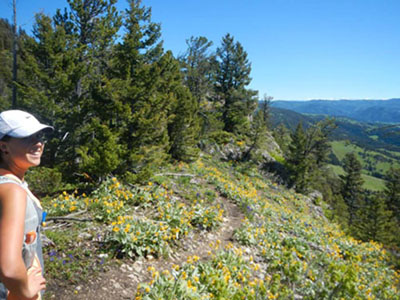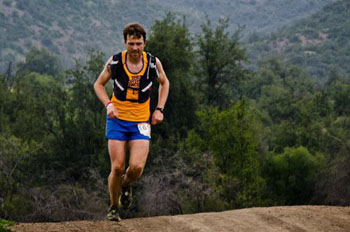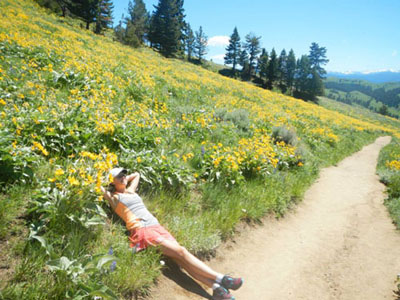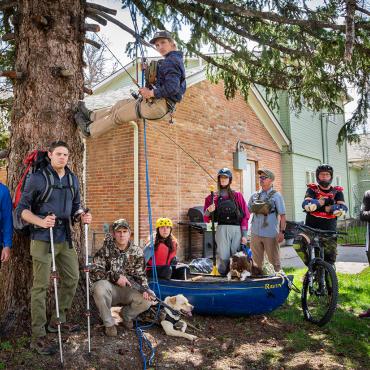Facedown in the Dirt
The dust on the trail whipped around the weathered trees and the sun beat down with uncompromising force as I began yet another consecutive lap up the ‘M’ Trail. Cognitive abilities fell by the wayside as I continued to trudge upwards. Beads of sweat dripped over my brow, while each breath became dryer and shallower. Suddenly my toe caught a rock, bringing me crashing down to the dry, hot earth. I could barely pick up my body—skin broken from the jagged rocks, psyche broken from physical and mental fatigue. Nothing could push me onward right now; the trail had beaten me. And then I heard it: the whomp, whomp, whomp of helicopter blades overhead. I looked up in panic, hands still hugging the earth, and felt my heart rate quicken. How had they found me?! The helicopter circled back and descended closer to the trail, tracking my every move. I lay on the ground, stricken with fear. They must not see me!

While my imagination ran away from me that afternoon, the sheer exhaustion was nothing short of a brutal reality check. Every runner has had those moments of terminating fatigue, when she believes the trail is leading her to the Grim Reaper, but somehow we push through and finish the run. Despite running into these moments of exhaustion on a frequent basis, they never seem to get any easier. If they are indeed inevitable, is there anything runners can do?
Know when to push it, know when to let it go
“There are so many reasons to feel like you've hit a wall,” says Missoula ultrarunner, Mike Foote. “It takes practice and experience to be objective enough in the moment to know what is going on.” A humble yurt-dwelling runner, Foote’s race bibs read Montana, Wyoming, Utah, France, and Chile, with multiple first-place medals. Through his training, Foote has learned that the first step to dealing with exhaustion, whether you are on the Gallagator Trail or sprinting up Hyalite Peak, is to assess your pain. He asks, “Is it because you are low on calories, electrolytes, water? Is it because you haven't been getting enough sleep? Is it because it's 90 degrees out?” If you fall into the category of the Bozeman yogis, then you have been told repeatedly by your yoga instructor to “listen to your body.” While it took me years to understand what that meant, the advice is critical for athletes. Know when to push it, know when to let it go, and learn how to accept what your body tells you.

"Accept the low points with patience and grace"
Assessing the pain can work when there's something to assess, but what about when your calories are sufficient and you’ve been diligently sipping your electrolytes, but somehow you can't lift yourself off the trail before the preschoolers run past? “Keep the positive mental thoughts going,” encourages Foote. “I often think to myself to accept the low points, or ‘the wall,’ with patience and grace…[rather than] with bullheadedness, stubbornness, or frustration.” Foote remembers a time during a 100-mile race in Utah where he and another racer were vying for first place, but Foote fell behind at mile 65. Foote says, “Instead of focusing on how poorly I felt and how frustrated I was that I couldn't keep up, I started to think about how lucky I was to be in a 100-mile mountain running event.” The positive vibes sent him soaring to the finish line in first place with a new course record.

Run like a kid
Unfortunately, I have not had any similar cathartic experiences on training runs or in races as Foote has had, but I have managed to push through the pain. This brings us back to that dreadful "M" run when my teeth left an imprint on the trail and I couldn’t fathom the idea of running any further. I was not happy, I was not relaxed, and I did not think, “Man, I am just so lucky to be facedown in the dirt right now!” but the helicopter chase scene flipped a switch in my mind. Suddenly I let all stress and pressure of the run subside and I ran like a kid again. I flew down the mountain with ease, a smile on my face, the James Bond theme running through my head. To put it simply, I had fun and remembered why I started running in the first place. You could even say I even felt lucky to be up there.






